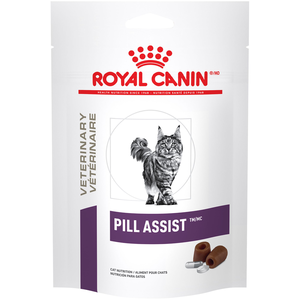Royal Canin Veterinary Diet Pill Assist For Cats Review
PawDiet has been helping pet owners since 2015. To fund our efforts, articles may include affiliate links; if you buy something through a link, we may earn a commission.
Review of Royal Canin Veterinary Diet Pill Assist For Cats
According to our most recent data, this product is intended for intermittent or supplemental feeding only.
Review of Ingredients
In our review of Royal Canin Veterinary Diet Pill Assist For Cats, we'll examine all 19 ingredients and highlight the nutritional contribution of each ingredient.
While the first few ingredients typically dominate the recipe's composition, ingredients in small quantities can still have a meaningful impact on the overall nutritional profile of the recipe.
Glycerin is a natural, plant-based ingredient used as a humectant in cat food. It helps to retain moisture, keeping the food fresh and palatable while also providing a source of energy for your cat.
Water Sufficient for Processing ensures that your cat's food has the right consistency and texture, making it easier for them to chew and digest. Adequate water content in cat food is essential for maintaining proper hydration and overall health.
Chicken is a high-quality source of lean protein, providing essential amino acids for muscle growth, healthy skin, and coat, and supporting your cat's overall well-being.
Wheat Flour is a source of carbohydrates and dietary fiber, which provide energy and support your cat's digestive system. However, it is important to note that some cats may have sensitivities to wheat or gluten.
Chicken Liver is a nutrient-dense organ meat that provides essential vitamins, minerals, and amino acids for your cat's overall health. This unique ingredient supports muscle growth, healthy skin and coat, and proper immune function.
Wheat Gluten is a highly digestible source of protein that provides essential amino acids to support your cat's muscle development and overall health. It also contains fiber, which aids in digestion and helps maintain a healthy weight.
Vegetable Oil can provide essential fatty acids, which are crucial for maintaining healthy skin and a shiny coat in cats. They also play a role in supporting immune function, brain health, and overall well-being.
Corn Syrup is a carbohydrate source that provides a quick source of energy for your cat. However, it should be consumed in moderation due to its high sugar content.
Gum Arabic is a natural thickening agent and stabilizer derived from the Acacia tree. It helps maintain the texture of cat food and is considered safe for consumption.
Yeast Extract is a natural source of B vitamins, minerals, and antioxidants that support your cat's immune system, energy metabolism, and overall well-being.
Natural flavor enhances the palatability of the cat food, making it more appealing to finicky eaters.
Fructooligosaccharides are a type of prebiotic that promotes the growth of beneficial bacteria in your cat's digestive system, supporting overall gut health and immunity.
Fumaric acid is a food additive that is used as a flavor enhancer and pH regulator in cat foods.
Potassium sorbate is a preservative used to inhibit the growth of mold and yeast, helping to maintain the freshness of the product.
DL-alpha tocopherol acetate is a form of vitamin E, a powerful antioxidant that helps to support your cat's immune system.
Ascorbic Acid, also known as vitamin C, is an antioxidant that helps support your cat's immune system, combat oxidative stress, and promote overall health. Although cats can produce their own vitamin C, supplementation can be beneficial in certain situations or for specific health needs.
Rosemary Extract is a natural antioxidant and preservative that helps maintain the freshness and quality of your cat's food while also providing potential anti-inflammatory benefits.
Mixed Tocopherols are a type of vitamin E used as a natural preservative in cat food to maintain freshness and prolong shelf life.
Citric acid is a natural preservative that helps maintain the freshness and quality of your cat's food while also providing a tangy flavor that can stimulate your cat's appetite.
Review of Guaranteed Analysis
Crude Protein (min) of 19.00%: The main contributors to the crude protein content in this diet are chicken, chicken liver, and wheat gluten. Chicken and chicken liver are high-quality animal protein sources that provide essential amino acids necessary for a cat's health. Wheat gluten, derived from wheat flour, also contributes to the overall protein content, though it may not be as high-quality a protein source for cats as animal proteins.
Crude Fat (min) of 10.50%: The crude fat content is most likely provided by the chicken, which naturally contains fat, and the added vegetable oil. Fats are crucial for providing energy and supporting cell structure and the absorption of fat-soluble vitamins. The listed vegetable oil is a concentrated source of fat, which helps to achieve the minimum fat content required.
Crude Fiber (max) of 3.10%: The crude fiber content is relatively low, which is typical for cat food, as cats require a diet with less fiber compared to other animals like dogs. The sources of fiber in this diet could be wheat flour and gum Arabic. Wheat flour contains some amount of dietary fiber, and gum Arabic is a plant-derived gum that is rich in soluble fiber. However, because the maximum fiber content is capped at 3.10%, these ingredients are likely present in moderate amounts to avoid excessive fiber, which could interfere with nutrient absorption and digestion in cats.

